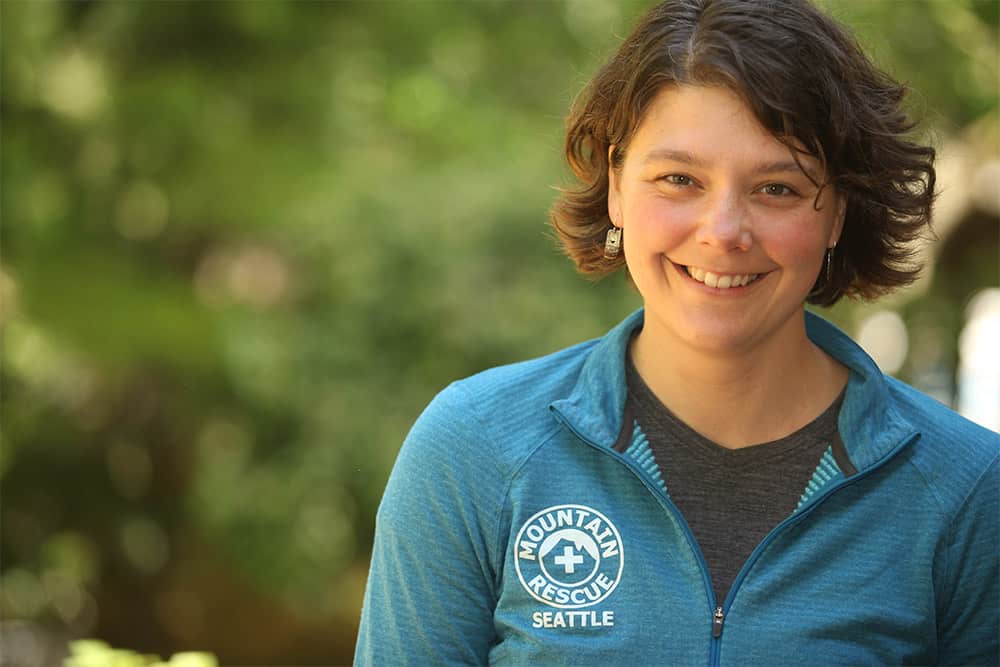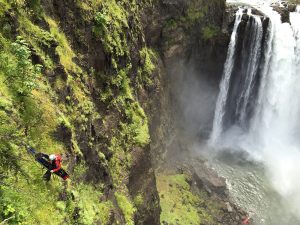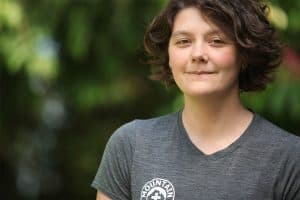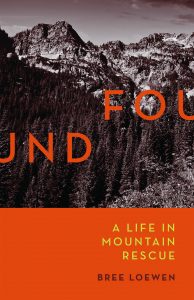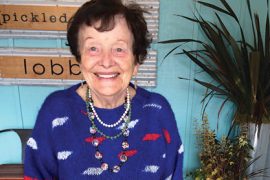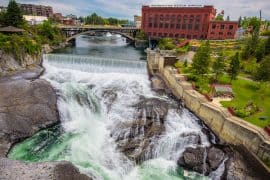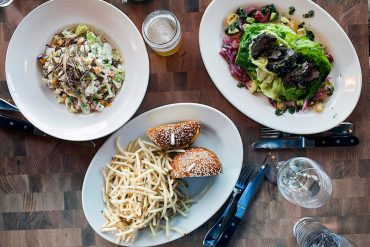Bree Loewen gives an inside line to a life in mountain rescue in Found
interview by Sheila Miller
As a longtime member of Seattle Mountain Rescue, Bree Loewen has seen tragic ends and epic tales of survival. In her new book, Found: A Life in Mountain Rescue, Loewen takes readers along on those highs and lows. She also lets you in on the emotional toll this (volunteer) work can take—on a marriage, a home life and a career.
Her rescue crew, made up of forty-eight volunteers, is on call every hour and every day of every year. And as more people move to the area, more outdoorsmen and women need rescuing.
“We’ve had a 36 percent increase in rescues over the past five years,” Loewen said. “It’s not that people are doing crazy stuff out there, it’s really not. It’s just that as the population of Seattle increases, this is where people go to recreate.”
In 2016, there were 160 rescues on the I-90 corridor, which Seattle Mountain Rescue patrols with help from other rescue organizations.
“We haven’t missed one yet,” she said.
Found is Loewen’s second book. Her first, Pickets and Dead Men, was about her experiences working as a National Park Service climbing ranger at Mount Rainier.
How did you get into mountain rescue?
I was a pretty bookish kid. My parents aren’t outdoorsy—the first time I ever slept outside was when I was 15, with some friends of mine. But actually, King County has a youth-based rescue group and I started doing that at age 15—I did my first body recovery when I was 15, which probably explains a lot about my personality. People don’t give young people the opportunity to do real work or trust them with really important things. I think that being trusted with important work helps people rise to the occasion, it’s a huge developmental factor. So I fell in love with the idea of being able to do work that meant something to the community.
How did you pick which rescue stories you wrote about in the book?
I had a lot to choose from. I went on thirty-four rescues last year and over a hundred in the past three years, and I think it’s the ones that stayed at the top of my mind, so I wrote them down. I write so I can sleep, and so I think whatever is keeping me up at night is the one that I write down next.
One of the themes in your book is being pulled in different directions between your roles as a stay-at-home mom and as a rescuer who puts her life on the line. Have you found peace there?
I don’t know that it’s necessarily that I’m more comfortable but that it’s more familiar. It’s always going to be a source of internal conflict. I think that I love the work, and I love my family and I know that sometimes those things are at odds, and I can’t love either of them any less. I can’t sacrifice either one of them, so I think it’s just a dichotomy that I’m going to have to live with.
When I was a park ranger, I sort of recognized that it was going to be very difficult doing that job and also live someplace where I could have a family, and so I figured out that I needed to balance the rescuing with the rest of my life. I’ve had a couple people ask me whether I have advice for moms who are balancing doing crazy stuff in the outdoors and also having a daughter. I don’t really have any great advice. My daughter is 8, and by the time she’s 18, I’m sure she’ll tell me, in really exacting terms, what I could have done as a parent. But right now I’m still sort of in the thick of it.
You write about not knowing what to say to the families of those who die in the backcountry or to people you’re rescuing who are in pain or dying. And yet you write about the situations so beautifully.
I think I’m a much better writer than I am a talker. I love having the ability to reflect on it before—I think it’s that way for everybody. I’m definitely still struggling in the moment with what those correct words are.
All through the history of the world people dealt with death all the time, and maybe because they were so familiar with that they developed traditions and rituals and whatever those words are that we’re supposed to say in those situations. But in the modern world, we’re really separated from death, to the point where it’s traumatic to see a dead person.
I feel a little bit like I’m reinventing the wheel and it’s super awkward, and I know I’ll never be able to say the right thing. I’m kind of torn, because on the one hand, maybe it’s just enough to be there for someone—you don’t necessarily have to say anything as long as you’re just there. And on the other hand it would be great to have those words.
The climbing community and the back-country ski community, these are high-risk things, so knowing those words is fairly significant for every back-country user. As a community, we’ve got a vested interest in being able to create that part of
our world.


